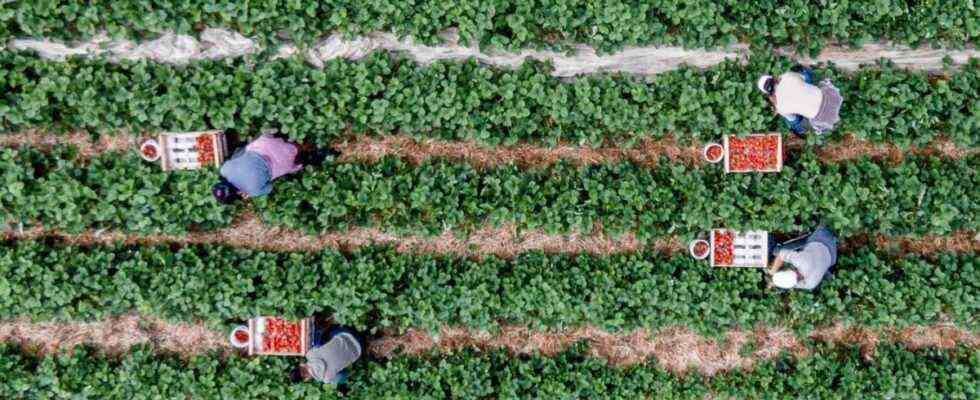Walled up windows. Residential containers in which moisture collects on ceilings and floors. Inadequate sanitary facilities. At the beginning of June, harvest workers from Georgia complained about their situation on a farm in Friedrichshafen on Lake Constance, where they were used as strawberry pickers. They published cell phone videos on social networks that give the impression that the 24 Georgian men and women on this farm were housed in cramped and partially dilapidated accommodations.
In recent years, cases have made headlines in which harvest workers were exploited or treated unworthily. The farmers’ association and the association of strawberry and asparagus farmers emphasized that these were individual cases. The farmers are dependent on the seasonal workers and have a great interest in treating them well. But are these really isolated cases, or is the fault in the system?
In Georgia, the recordings of the strawberry farm in Friedrichshafen were excitedly discussed. Almost 90,000 people from the country applied to work as harvest workers in Germany. This is possible for the first time this year because the Federal Employment Agency and the Georgian Labor Administration have concluded a mediation agreement. A maximum of 5000 Georgians can come to Germany for a few months if they are requested by local farmers. So far, according to the central foreign and specialist agency of the Federal Agency, the demand from farmers has remained well below this figure. According to the IG Bau trade union, around 280,000 harvest workers work in Germany each year.
The case from Friedrichshafen, the videos and the discussions about it reached the German embassy in the Georgian capital Tbilisi. The authority reported the case to Germany. Then not only the district office in the Lake Constance district intervened, but also the Mira advice center, which campaigns for the rights of foreign workers in Baden-Württemberg. Mira’s labor law experts have meanwhile arranged for the Georgian harvest workers to move to another farm. You have also taken on legal representation for the workers to clarify open questions about working conditions, payroll and health insurance.
The farmer who employed the 24 people rejected the criticism of the living and working conditions on his farm. He now no longer wants to comment on the matter in the media. The district office checked the accommodation and presented him with a list of deficiencies that he must remedy. A spokesman for the agency is confident that the problems will be resolved. “There is a serious willingness to cooperate,” he says. Around two dozen Romanian seasonal workers are still working on the strawberry farm.
Is this yard an exception?
Is everything okay then? Not from Werner Langenbacher’s point of view. The Mira counseling center called him in as a company chaplain. The theologian and trained mediator is a specialty in the Catholic Church: Few dioceses are so committed to open advice to employees as the Diocese of Rottenburg-Stuttgart, which includes the former state of Württemberg. Twelve company chaplains work there; one of them exclusively on the construction site of the “Stuttgart 21” railway project with its many foreign workers.
“Who tells me that the farm is the big exception?” Says Langenbacher. He visited several farms in the Lake Constance region and saw that many farmers go to great lengths to offer their seasonal workers good accommodation even under the conditions of the corona pandemic – but not all of them. Margarete Brugger from the Mira advice center has found that harvest workers are repeatedly faced with similar problems: a lack of health insurance and non-transparent bills, ignorance of how much wages are withheld for accommodation and meals. Often they are not informed about their rights. There is no central point to which they can turn.
Various authorities are responsible for checking the working conditions
The central foreign and specialist placement (ZAV) of the employment agency says that it is not aware of any further complaints from Georgian harvest workers. However, their role is limited: the ZAV examines the job offers of local farmers and forwards them to the Georgian employment agency. These then refer suitable candidates to the ZAV. According to the ZAV, in order to take part in the pilot project, farmers had to clearly state in their job offers which costs – for example for accommodation – the workers could have to face. The employers should also have committed to complying with all legal requirements, such as infection and occupational safety. Checking the actual working conditions is not a matter for the ZAV.
In fact, different authorities are responsible for this: the financial control of undeclared work by the customs as well as the health authorities and trade supervisory authorities of the municipalities. Langenbacher thinks this is unsatisfactory. He demands that at the start of the harvest season, all farms on which seasonal workers are deployed are checked once by a central official unit. In order to achieve this, he now wants to invite everyone involved to a discussion. So that bricked up windows, damp living containers and inadequate sanitary facilities are a thing of the past.

